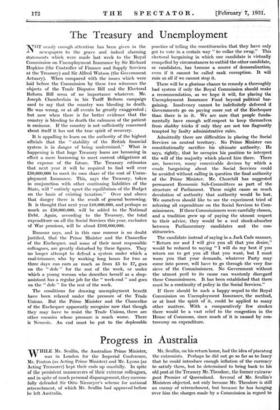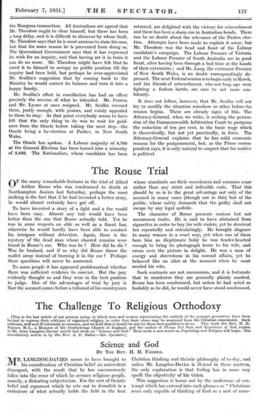Progress in Australia
"NATHILE Mr. Scullin, the Australian Prime Minister, was in London for the Imperial Conference, Mr. Fenton (as Acting Prime Minister) and Mr. Lyons (as -Acting Treasurer) kept their ends up manfully. In spite of the persistent manoeuvres of their extreme colleagues, and in spite of much personal disparagement, they success- fully defended sir Otto Niemeyer's scheme for national retrenchment, of which Mr. Scullin had approved before he left Australia. Mr. Scullin, on his return home, had the idea of placating the extremists. Perhaps he did not go so far as to fancy that he could introduce enough inflation of the currency to satisfy them, but he determined to bring back to his old post at the Treasury Mr. Theodore, the former extrava- gant Premier of Queensland. Several of Mr. Scullin's Ministers objected, not only because Mr. Theodore is still an enemy of retrenchment, but because he has hanging over him the charges made by a Commission in regard to the Mungana transaction. All Australians are agreed that Mr. Theodore ought to clear himself, but there has been a long delay, and it is difficult to discover by whose fault. Mr. Theodore says that he is most anxious to state his case, but that for some reason he is prevented from doing so. The Queensland ,Government says that it has expressed its wish for an inquiry, and that having set it in train it can do no more. Mr. Theodore might have felt that he owed it to himself to occupy no public position till the inquiry had been held, but perhaps he over-appreciated Mr. Scullin's suggestion that by coming back to the Ministry he would correct its balance and turn it into a happy family.
Mr. - Scullin's effort in conciliation has had an effect precisely the reverse of what he intended. Mr. Fenton and Mr. Lyons at once resigned. Mr; Scullin covered them, justly -enough, with praises, and vainly appealed to them to stay. At that point everybody seems to have felt that the only thing to do was to wait for guid- ance from the Oracle -before taking the next step—the Oracle being a by-election at Parkes, in New South Wales.
The Oracle has spoken. A Labour niajority of 8,769 at the -General Election has been turned -into a -minority of 8,833. The Nationalists, whose candidate has been returned, are delighted with the victory for retrenchment and there has been a sharp rise in Australian bonds. There can be no doubt about the relevance of the Parkes elec- tion. Attempts have been made to explain it away, but Mr. Theodore was the head and front of the Labour -candidate's campaign. The Labour Premier of Victoria and the Labour Premier of South Australia are in good heart, after having been through a bad time at the hands of their extremists ; and Mr. Lang, the extremist Premier of New South Wales, is no doubt correspondingly de- pressed. The next Federal session is to begin early in March, and the friends of retrenchment, who not long ago were -fighting a forlorn battle, are sure to act more con- fidently.
It does not follow, however, that Mr. Scullin will not try to modify the situation somehow or other before the session begins. There are already signs of this. The Attorney-General, when we write, is seeking the permis- sion of the Commonwealth Arbitration Court to postpone the reduction of ten per cent. in the basic wage which is theoretically, but not yet practically, in force. The ,Attorney-General explains that he has solid economic reasons for the postponement, but, as the Times corres- pondent says, it is only natural to suspect that his motive is political.











































 Previous page
Previous page